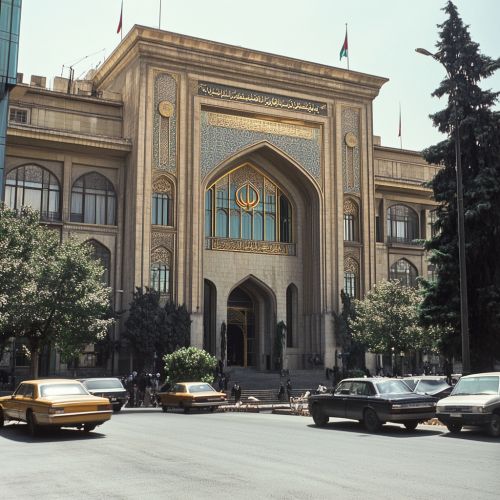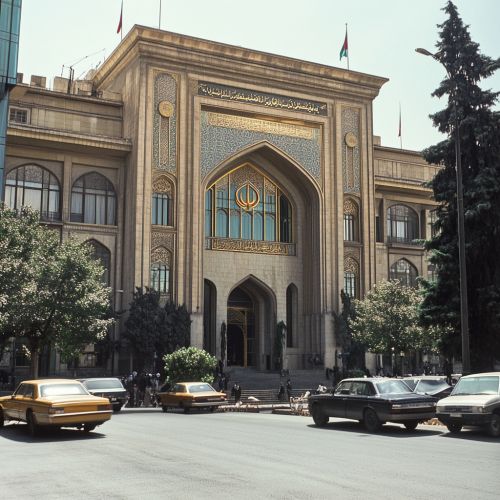Central Bank of the Islamic Republic of Iran: Difference between revisions
(Created page with "== Overview == The Central Bank of the Islamic Republic of Iran (CBI) is the primary financial institution responsible for the regulation and supervision of the monetary and banking system in Iran. Established in 1960, the CBI plays a crucial role in formulating and implementing monetary policy, issuing currency, managing foreign exchange and gold reserves, and overseeing the banking sector. It operates under the jurisdiction of the Iranian government and is headquartere...") |
No edit summary |
||
| Line 2: | Line 2: | ||
The Central Bank of the Islamic Republic of Iran (CBI) is the primary financial institution responsible for the regulation and supervision of the monetary and banking system in Iran. Established in 1960, the CBI plays a crucial role in formulating and implementing monetary policy, issuing currency, managing foreign exchange and gold reserves, and overseeing the banking sector. It operates under the jurisdiction of the Iranian government and is headquartered in Tehran. | The Central Bank of the Islamic Republic of Iran (CBI) is the primary financial institution responsible for the regulation and supervision of the monetary and banking system in Iran. Established in 1960, the CBI plays a crucial role in formulating and implementing monetary policy, issuing currency, managing foreign exchange and gold reserves, and overseeing the banking sector. It operates under the jurisdiction of the Iranian government and is headquartered in Tehran. | ||
[[Image:Detail-97703.jpg|thumb|center|The main building of the Central Bank of the Islamic Republic of Iran in Tehran.|class=only_on_mobile]] | |||
[[Image:Detail-97704.jpg|thumb|center|The main building of the Central Bank of the Islamic Republic of Iran in Tehran.|class=only_on_desktop]] | |||
== History == | == History == | ||
Latest revision as of 11:57, 19 August 2024
Overview
The Central Bank of the Islamic Republic of Iran (CBI) is the primary financial institution responsible for the regulation and supervision of the monetary and banking system in Iran. Established in 1960, the CBI plays a crucial role in formulating and implementing monetary policy, issuing currency, managing foreign exchange and gold reserves, and overseeing the banking sector. It operates under the jurisdiction of the Iranian government and is headquartered in Tehran.


History
The establishment of the Central Bank of the Islamic Republic of Iran marked a significant milestone in the country's financial history. Prior to its inception, Iran's monetary policy and banking activities were managed by various institutions, including the National Bank of Iran (Bank Melli Iran). The need for a centralized authority to oversee the nation's monetary policy became evident, leading to the creation of the CBI.
Pre-Revolution Era
Before the 1979 Islamic Revolution, the CBI operated under a framework that was largely influenced by Western banking practices. The bank's primary objectives included maintaining price stability, ensuring the stability of the national currency (the Iranian rial), and promoting economic growth. During this period, the CBI also played a pivotal role in managing Iran's foreign exchange reserves and facilitating international trade.
Post-Revolution Era
The 1979 Islamic Revolution brought about significant changes in Iran's political, social, and economic landscape. The CBI underwent substantial restructuring to align with the principles of Islamic finance, which prohibits interest (riba) and emphasizes risk-sharing and ethical investment. The bank's operations were reoriented to comply with Sharia law, leading to the introduction of various Islamic financial instruments.
Functions and Responsibilities
The CBI's primary functions and responsibilities encompass a wide range of activities aimed at ensuring the stability and efficiency of Iran's financial system. These functions include:
Monetary Policy
The CBI is responsible for formulating and implementing monetary policy to achieve macroeconomic stability. This involves controlling inflation, managing interest rates, and regulating the money supply. The bank uses various tools, such as open market operations, reserve requirements, and discount rates, to influence economic activity and maintain price stability.
Currency Issuance
One of the key responsibilities of the CBI is the issuance and regulation of the national currency, the Iranian rial. The bank ensures the availability of sufficient currency to meet the needs of the economy while preventing counterfeiting and maintaining the integrity of the currency.
Foreign Exchange Management
The CBI manages Iran's foreign exchange reserves and oversees the country's foreign exchange market. This includes regulating the exchange rate, facilitating international trade, and ensuring the stability of the national currency in the global market. The bank also implements policies to attract foreign investment and manage capital flows.
Banking Supervision
The CBI supervises and regulates the banking sector to ensure its soundness and stability. This involves setting prudential standards, conducting inspections, and enforcing compliance with banking regulations. The bank also works to enhance the resilience of the financial system by promoting good governance and risk management practices among financial institutions.
Payment Systems
The CBI is responsible for overseeing and developing the national payment systems to ensure their efficiency, security, and reliability. This includes the regulation of electronic payment systems, interbank transfer systems, and the clearing and settlement of financial transactions.
Organizational Structure
The organizational structure of the CBI is designed to facilitate the effective execution of its functions and responsibilities. The bank is governed by a board of directors, which includes the governor, deputy governors, and other senior officials. The governor, appointed by the President of Iran, serves as the chief executive officer of the bank.
Departments and Divisions
The CBI is divided into several departments and divisions, each responsible for specific areas of operation. Key departments include:
- Monetary and Banking Research Institute: Conducts research and analysis on monetary policy, banking, and economic issues.
- Foreign Exchange Department: Manages foreign exchange reserves and oversees foreign exchange transactions.
- Banking Supervision Department: Regulates and supervises the banking sector to ensure its stability and compliance with regulations.
- Payment Systems Department: Oversees the development and regulation of national payment systems.
- Economic Research and Policy Department: Provides economic analysis and policy recommendations to support the bank's decision-making process.
Monetary Policy Framework
The CBI's monetary policy framework is designed to achieve macroeconomic stability and promote sustainable economic growth. The bank uses a combination of direct and indirect instruments to influence monetary conditions and achieve its policy objectives.
Inflation Targeting
Inflation targeting is a key component of the CBI's monetary policy framework. The bank sets an explicit inflation target and uses various policy tools to achieve this target. By controlling inflation, the CBI aims to maintain price stability, which is essential for economic growth and stability.
Interest Rate Policy
The CBI uses interest rate policy as a tool to influence economic activity and control inflation. By adjusting the discount rate and other interest rates, the bank can influence borrowing and lending behavior, thereby affecting aggregate demand and inflation.
Open Market Operations
Open market operations involve the buying and selling of government securities in the open market to influence the money supply and interest rates. The CBI uses open market operations to manage liquidity in the banking system and achieve its monetary policy objectives.
Reserve Requirements
The CBI sets reserve requirements for banks, which dictate the minimum amount of reserves that banks must hold against their deposits. By adjusting reserve requirements, the bank can influence the amount of money that banks can lend, thereby affecting the money supply and economic activity.
Islamic Banking and Finance
Following the 1979 Islamic Revolution, Iran's banking system was restructured to comply with Islamic principles. The CBI played a central role in this transformation, introducing various Islamic financial instruments and practices.
Prohibition of Interest (Riba)
Islamic finance prohibits the charging of interest (riba) on loans and investments. Instead, it emphasizes profit-sharing and risk-sharing arrangements. The CBI ensures that all financial transactions and instruments comply with this principle.
Islamic Financial Instruments
The CBI has introduced a range of Islamic financial instruments to facilitate banking and investment activities. These include:
- Mudarabah: A profit-sharing arrangement where one party provides capital and the other party provides expertise and management.
- Musharakah: A joint venture where all parties contribute capital and share profits and losses.
- Ijarah: An Islamic leasing arrangement where the lessor retains ownership of the asset and the lessee pays rent for its use.
- Sukuk: Islamic bonds that represent ownership in a tangible asset or a pool of assets.
Sharia Compliance
The CBI ensures that all financial institutions and transactions comply with Sharia law. This involves the establishment of Sharia boards within banks to oversee and approve financial products and services. The bank also provides guidelines and regulations to ensure compliance with Islamic principles.
Challenges and Reforms
The CBI faces several challenges in fulfilling its mandate and ensuring the stability of Iran's financial system. These challenges include economic sanctions, inflation, and the need for structural reforms.
Economic Sanctions
Iran has been subject to various economic sanctions imposed by the international community, which have had a significant impact on the country's economy and financial system. The CBI has had to navigate these challenges by implementing measures to mitigate the effects of sanctions and maintain financial stability.
Inflation Control
Controlling inflation has been a persistent challenge for the CBI. High inflation rates have eroded the purchasing power of the Iranian rial and created economic instability. The bank has implemented various monetary policy measures to control inflation, but achieving long-term price stability remains a key objective.
Structural Reforms
The CBI has undertaken several structural reforms to enhance the efficiency and stability of the financial system. These reforms include modernizing the banking sector, improving regulatory frameworks, and promoting financial inclusion. The bank continues to work on implementing reforms to address existing challenges and support economic growth.
International Relations
The CBI plays a crucial role in managing Iran's international financial relations and facilitating trade and investment with other countries.
Bilateral and Multilateral Agreements
The CBI negotiates and enters into bilateral and multilateral agreements with other countries and international organizations to promote trade and investment. These agreements cover various areas, including currency exchange, banking cooperation, and financial regulation.
Foreign Exchange Reserves
The management of foreign exchange reserves is a critical function of the CBI. The bank ensures that Iran has sufficient reserves to meet its international obligations and maintain the stability of the national currency. The CBI also implements policies to attract foreign investment and manage capital flows.
International Cooperation
The CBI engages in international cooperation with other central banks and financial institutions to share knowledge and best practices. This includes participating in international forums and organizations, such as the International Monetary Fund (IMF) and the Bank for International Settlements (BIS).
Future Outlook
The future outlook for the CBI involves addressing existing challenges and leveraging opportunities to enhance the stability and efficiency of Iran's financial system.
Digital Transformation
The CBI is exploring the potential of digital transformation to improve the efficiency and accessibility of financial services. This includes the development of digital payment systems, the introduction of digital currencies, and the promotion of fintech innovations.
Financial Inclusion
Promoting financial inclusion is a key priority for the CBI. The bank aims to ensure that all segments of the population have access to financial services, including banking, insurance, and investment products. This involves implementing policies to support the development of microfinance and other inclusive financial services.
Sustainable Finance
The CBI is committed to promoting sustainable finance and supporting environmentally and socially responsible investments. This includes the development of green finance initiatives and the integration of environmental, social, and governance (ESG) criteria into financial decision-making.
See Also
- Islamic Banking
- Monetary Policy
- Foreign Exchange Reserves
- Inflation Targeting
- Open Market Operations
